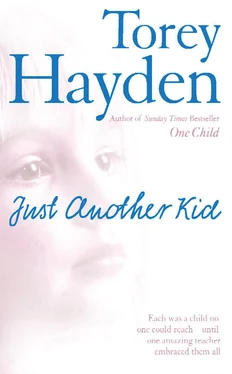“Trash with class, that’s what it boils down to,” Carolyn said. She leaned across the table and helped herself to my grapes. “She puts on all these airs. I mean, look at this silly business about Dr . Taylor. She thinks she’s too good to even talk to the rest of us. She’ll never even say hello. And who is she? What would she be if she weren’t Tom Considyne’s little bimbo? He’s the one who’s famous. He’s got all the money. But he’s nice. He’s real friendly, if you run into him down at the Co-op or something. If he’s been introduced to you, he’ll always remember your name. If he’s got any fault, it’s that he’s too casual about things. He tends not to follow through. He drove Rita wild last year. She was Leslie’s first-grade teacher. She was always arranging things with him to try and help Leslie, and he was always promising to do them, but he never did. That, and also he never answers his phone. If their help’s out, you’ll never be able to contact him, short of knocking the door down. He’s got a studio out in back of his house where he does his painting, and last year when Leslie went into a diabetic coma, Rita stood outside his studio knocking on the window, and he never even bothered to turn around and see who it was.”
“This sounds like a soap opera, Carolyn.”
“Ooooh, it’s better,” she said, with a gleam in her eye. “It’s real.”
I grimaced.
Carolyn smiled knowingly and pulled over the rest of the files to look at them. “You want me to fill you in on these too?”
“You know about them?” I asked incredulously.
She laughed. “No. But I’m sure I could think of something.”
We both dissolved into giggles.
After Carolyn left, I opened the Considyne file. There was nothing in there that hinted at the steamy stories Carolyn had been telling me. Dr. Taylor was a physicist. Mr. Considyne was listed simply as a painter. The first time I’d read it, I’d thought it meant house-painter. The only thing to have caught my eye initially was Dr. Taylor’s first name: Ladbrooke. The peculiarity of it had not struck me so much as idle curiosity over what, in intimate moments, one would call someone with such a formal name.
There was a fairly extensive sheaf of papers on Leslie and her disturbance. As in so many cases of severe handicaps of this nature, there was little certainty about exactly what her problem was and what had caused it. Apparently her birth and early infancy had been normal. She was a full-term baby and, while placid and not particularly responsive, she’d been easy to care for. Her progress past the usual milestones had been slow, but within normal limits. Then, somewhere around two and a half, she had begun to deteriorate. What little vocabulary she did have disappeared. What progress she’d made in terms of toilet training and self-care was lost. A futile round of doctors and psychiatrists started soon after Leslie was three. Autism, one report said. Mental retardation, said another. Childhood schizophrenia, said a third. No one seemed to know for sure, but everyone was willing to guess.
Amazingly, to my way of thinking, Leslie had had no special treatment program and, indeed, was kept in a regular classroom for two years. She had, in fact, spent more time in the classroom than had Mariana. There were a few acerbic jottings from Rita Ashworth, Leslie’s previous teacher, about the challenges this presented, and I got the impression that in the end, Leslie had been left pretty much to her own devices.
There was nothing written anywhere to suggest how Leslie’s parents had come to terms with their daughter’s handicap nor anything about what the home situation was like. There was a brief mention of two older stepchildren and how the younger of them, a teenaged girl, had a poor relationship with Leslie, but there was nothing else.
The first week passed. The three children were very different from one another, and I did nothing more than scuttle among them those first days, trying to keep order. Both Leslie and Dirkie could have done with a teacher apiece. Dirkie was fairly advanced in comparison to many other schizophrenic children I’d encountered. He was toilet trained, could express himself quite well, could follow simple instructions, and even had mastered a fair number of academic skills, although at a level way below what would have been expected for his chronological age. However, he still needed virtual one-to-one teaching to stay on task.
Dirkie’s worst problems came from an assortment of obsessions with things that were very commonly encountered, such as cats, hair, old men and women, fire engines and door hinges. Discharging the excitement generated by the obsessions took the better part of most days. First, an obsession would come to mind—perhaps he’d see a picture or hear a sound, and that would start him off. Then he’d become excited, then agitated, then frenzied, needing desperately to fulfill elaborate rituals before he could free his mind and think of something else. I became able to discern when one of the obsessions was overtaking Dirkie, because he would begin to talk in an odd voice. He spoke in a weird manner most of the time, with his voice deep and gravelly, like a child imitating its father, although Dirkie did have a normal speaking voice, rarely used. However, when one of his obsessions overtook him, Dirkie’s voice grew deeper and became urgent sounding, taking on a tone that made him sound permanently appalled. Then, as the excitement increased, he’d lose control and be unable to form words. He hooted instead. Hoo-hoo-hoo-hoo-hoo. No other sound, just that. And he’d begin to clap. Physical excitement took over from there, and he could no longer sit still. On his feet, he’d adopt a mincing, disjointed sort of locomotion, like a marionette with a very bad operator, and usually, he’d end up under the table, where he’d sit, clapping and hooting, and frequently, masturbating frantically on the table leg. Then calm would return.
Sometimes I could successfully interrupt the hoot-and-clap syndrome early enough to quell the frenzy and reorient Dirkie to the task at hand. More often, I couldn’t. And if he’d gone beyond a certain point, he needed to continue, because otherwise, he exploded, screaming and yelling, kicking and slapping, tearing papers from the bulletin boards, magazines from the shelves, overturning chairs, ripping his clothes and banging himself against walls and furniture. But even without such cataclysmic conclusions, Dirkie’s obsessions ruled us.
“Do you have a cat?” he asked me on the first day.
“Yes,” I answered, not realizing what I had started.
His eyes grew shiny with excitement. “What kind is it?”
“Just a cat. Tabby and white.”
But that wasn’t enough information. “How tall is it? How long is its tail?”
Thinking to put him off, I explained it wasn’t even my cat, but rather a cat on loan from my grandparents to keep me company. So I didn’t know the beast too intimately. But this didn’t put Dirkie off. Indeed, the novelty of the arrangement intrigued him, and he questioned me endlessly. “What color eyes does your cat have? When’s his birthday? How long did your grandparents have him before you got him? Here,” he demanded and gave me a piece of paper. “Draw a picture of your cat.” When I demurred, he panicked. “Draw it! Draw it! Draw your cat! Draw your cat in his basket. Draw your cat in the bathtub. Draw your cat eating food,” he screamed, his voice becoming louder with each demand. So I began to draw, and immediately, Dirkie quieted. “That’s your cat. You’re drawing your cat. You’re drawing your cat sitting up.” But when I finished, he thrust another sheet of paper under my nose. “Draw your cat lying down.” The room was soon a veritable gallery of my rather undistinguished cat drawings.
Читать дальше












